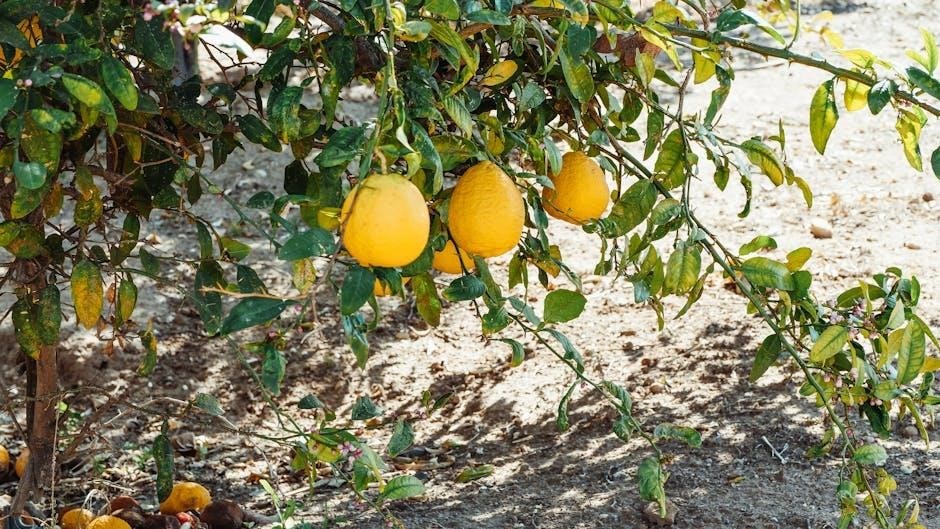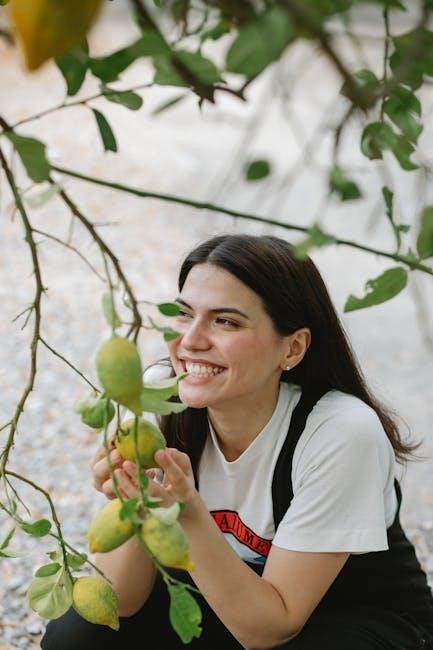Title: “As Long as the Lemon Trees Grow” by Zoulfa Katouh
As Long as the Lemon Trees Grow, written by Syrian-American author Zoulfa Katouh, is a poignant novel set during the Syrian Civil War. It follows Salama Kassab, a young pharmacy student turned hospital volunteer, as she navigates love, loss, and resilience amidst war. The book, published by Little, Brown Books for Young Readers, has garnered acclaim for its emotional depth and hope-filled narrative. Available in PDF, EPUB, and MOBI formats, it has been recognized as an Amazon Best Book of the Month and shortlisted for the British Book Awards.
1.1. Author Background: Zoulfa Katouh
Zoulfa Katouh is a Syrian-American author known for her powerful storytelling and deep connection to her heritage. Born in Syria, she brings a unique perspective to her writing, blending personal experiences with the rich cultural history of her homeland. Katouh’s debut novel, As Long as the Lemon Trees Grow, reflects her poignant understanding of war, resilience, and hope. With a background in creative writing, Katouh has crafted a narrative that resonates globally, earning her recognition as a rising voice in contemporary literature. Her work often highlights the human cost of conflict and the enduring strength of love and community. Katouh’s personal connection to Syria adds authenticity to her writing, making her a compelling figure in the literary world.
1.2. Plot Summary
As Long as the Lemon Trees Grow by Zoulfa Katouh is a heart-wrenching narrative set against the backdrop of the Syrian Civil War. The story follows Salama Kassab, an 18-year-old pharmacy student whose life is upended when the revolution erupts. Forced to abandon her studies, Salama volunteers at a hospital in Homs, where she witnesses the brutal realities of war. Amidst the chaos, she finds solace in her blossoming romance with Kenan, a fellow volunteer, and clings to the hope of escaping Syria with her family. The novel intertwines Salama’s personal journey with the broader struggles of her community, exploring themes of love, loss, and resilience. The lemon trees, a symbol of enduring hope and the beauty of Syria, serve as a recurring motif, anchoring Salama’s dreams of a better future. Through her story, Katouh paints a vivid portrait of a nation torn apart, yet sustained by the unyielding spirit of its people.

1.3. Setting: War-Torn Syria
The novel As Long as the Lemon Trees Grow is set against the harrowing backdrop of the Syrian Civil War, a conflict that has devastated the country and its people. The story unfolds in the city of Homs, a place once vibrant with life but now scarred by relentless violence and destruction. The setting is marked by the chaos of war: shattered buildings, overcrowded hospitals, and the constant threat of danger. The hospital where Salama volunteers becomes a microcosm of the broader struggle, with makeshift medical care and the overwhelming influx of wounded civilians. The war-torn environment is not just a physical setting but also an emotional one, as the characters grapple with loss, fear, and the erosion of hope. Yet, amidst the devastation, the lemon trees—symbols of resilience and beauty—endure, offering a glimmer of hope and a connection to the Syria that once was. The setting vividly captures the horrors of war while highlighting the strength and resilience of the Syrian people.

1.4. Protagonist: Salama Kassab
Salama Kassab, the protagonist of As Long as the Lemon Trees Grow, is an 18-year-old pharmacy student whose life is upended by the Syrian Civil War. Initially, she is portrayed as a young woman with a promising future, living with her family and on the brink of potential marriage. However, the war forces her into a new reality: volunteering at a hospital in Homs, where she witnesses unimaginable suffering and loss. Despite her youth, Salama exhibits extraordinary courage and determination, taking on responsibilities far beyond her years. Her character evolves as she faces the harsh realities of war, grappling with the moral dilemmas of survival and the personal sacrifices required to help others. Salama’s journey is both deeply personal and universally relatable, as she struggles to maintain hope and humanity in a world torn apart by conflict. Through her, the novel highlights the resilience of ordinary individuals caught in extraordinary circumstances and their capacity to love, care, and resist even in the face of overwhelming despair.
1.5. Themes: Hope, Love, and Resilience
As Long as the Lemon Trees Grow by Zoulfa Katouh explores themes of hope, love, and resilience through the lens of war-torn Syria. Amidst the devastation of the Syrian Civil War, hope emerges as a fragile yet unyielding force, symbolized by the enduring lemon trees. These trees represent the possibility of renewal and the persistence of life even in the darkest moments. Love is portrayed not only as romantic love but also as familial bonds and communal solidarity, which sustain the characters through unimaginable suffering. Resilience is a central theme, as Salama and others adapt to the harsh realities of war, finding strength in their humanity and determination to survive. The novel underscores how these themes intertwine, offering a powerful exploration of the human spirit’s capacity to endure and rebuild. By weaving these elements into the narrative, Katouh creates a story that is both a tribute to the resilience of the Syrian people and a universal testament to the enduring power of hope and love in the face of adversity.
1.6. Symbolism: The Lemon Trees
The lemon trees in Zoulfa Katouh’s As Long as the Lemon Trees Grow hold profound symbolic meaning, reflecting the duality of life and war. They symbolize hope and renewal, as their resilience mirrors the enduring spirit of the Syrian people. The trees endure despite the chaos, representing the beauty and vitality that persist even in war-torn landscapes. They also symbolize loss and memory, as they remind Salama of her family and the life she once knew. The lemon trees serve as a metaphor for the cyclical nature of life, where growth and decay coexist. Their presence throughout the novel underscores the themes of resilience and hope, offering a poignant reminder of what remains constant amidst destruction. The lemon trees are not just a backdrop but a living testament to the human spirit’s ability to find light in darkness, making them a central and evocative symbol in the story.
1.7. Book Reception and Reviews
As Long as the Lemon Trees Grow has received widespread critical acclaim for its powerful storytelling and emotional depth. Reviewers praise Zoulfa Katouh’s ability to weave a tale of hope, love, and resilience set against the backdrop of war-torn Syria. The novel has been described as a “searing story of war, loss, family, and love” and a “phenomenal tale” that captures the essence of Syria’s past and present. It has been shortlisted for the British Book Awards and named an Amazon Best Book of the Month, further solidifying its impact. Readers and critics alike have highlighted its poignant portrayal of the human spirit’s ability to endure even in the face of immense adversity. The book has also been praised for its vivid imagery and the way it balances heartbreak with hope, making it a compelling read for fans of historical and contemporary fiction. Its emotional resonance and timely themes have left a lasting impression on readers worldwide.

1.8. PDF and E-Book Formats
As Long as the Lemon Trees Grow is widely available in various digital formats, ensuring accessibility for readers worldwide. The novel can be downloaded as a PDF, EPUB, or MOBI file, making it compatible with popular e-readers, tablets, and smartphones. Published by Little, Brown Books for Young Readers, the e-book versions maintain the same emotional depth and vivid storytelling as the physical copy. Many online platforms offer free or paid downloads of the book, with options to read it through services like Kindle Unlimited. The digital versions have been particularly praised for their ease of access, allowing readers to engage with the story anytime and anywhere. The availability of these formats has contributed to the book’s growing popularity, especially among younger readers who prefer digital media. This accessibility has also made it easier for educational institutions to incorporate the novel into their curricula, further enhancing its reach and impact.
1.9. Educational Resources and Teaching
As Long as the Lemon Trees Grow is increasingly being used in educational settings due to its powerful portrayal of war, resilience, and cultural identity. Teachers and educators have access to a 15-page educational resource pack designed to accompany the novel. This pack provides discussion questions, historical context, and activities to help students engage with the book’s themes. The novel is particularly suitable for teaching students about the Syrian Civil War, the impact of conflict on civilians, and the importance of hope and resilience. Many schools have incorporated the book into their curricula, praising its ability to foster empathy and understanding. Additionally, the book’s availability in PDF and e-book formats makes it easy for educators to distribute and use in classrooms. The story’s emotional depth and historical relevance make it an invaluable tool for teaching about global issues and promoting cultural awareness. Educators are encouraged to read the book themselves before introducing it to students to facilitate meaningful discussions and reflections.

1.10. Author’s Personal Connection to Syria
Zoulfa Katouh’s personal connection to Syria deeply influenced her writing of As Long as the Lemon Trees Grow. As a Syrian-American author, Katouh draws from her heritage and the stories of those affected by the Syrian Civil War. Her emotional investment in the country’s history and culture is evident in the novel’s vivid portrayal of life in war-torn Syria. The lemon trees, a recurring symbol in the book, hold personal significance for Katouh, representing both the beauty of Syria and the harsh realities of loss. Her friends even affectionately call her the “lemon witch,” reflecting her attachment to the imagery of lemon trees. Katouh’s intent was to craft a “love letter to Syria,” blending personal experiences with fictional narratives to create a story that resonates universally. Her connection to Syria is not just about the land but also about its people, their resilience, and their enduring hope; This personal tie ensures that the novel is both authentic and deeply moving, offering readers a glimpse into the heart of Syria through her eyes.

1.11. Cultural and Historical Context
Zoulfa Katouh’s As Long as the Lemon Trees Grow is deeply rooted in the cultural and historical fabric of Syria, offering a vivid portrayal of life during the Syrian Civil War. The novel captures the essence of Syrian traditions, family values, and the resilience of its people amidst chaos. Set against the backdrop of the Syrian Revolution, the story reflects the societal upheaval and the struggle for freedom that defined the era. Katouh intricately weaves historical events with personal narratives, providing a poignant glimpse into the lives of Syrians caught in the conflict. The book highlights the cultural significance of symbols like lemon trees, which embody both the beauty of Syria’s past and the enduring hope for its future. By blending historical context with cultural elements, Katouh creates a story that not only educates but also resonates emotionally with readers. This blend of history and culture makes the novel a powerful tool for understanding the Syrian experience during one of its most tumultuous periods.
1.12. The Role of Family and Community
Families and communities play a vital role in As Long as the Lemon Trees Grow, serving as a source of strength and resilience for the protagonist, Salama Kassab. In the midst of war-torn Syria, Salama’s family becomes her anchor, providing emotional support and a sense of normalcy. Her parents and older brother embody the traditional Syrian values of unity and loyalty, which are tested but never broken by the conflict. Beyond her immediate family, the community in Homs rallies together, sharing resources and hopes for a better future. This collective resilience highlights the cultural importance of close-knit relationships in Syrian society. The novel portrays how families and communities become lifelines, offering comfort and hope even in the darkest times. Through these portrayals, Katouh emphasizes the enduring power of human connection and the ways in which loved ones sustain each other through unimaginable hardship.
1.13. The Significance of Lemon Trees in the Story

The lemon trees in As Long as the Lemon Trees Grow hold profound symbolic meaning, serving as a metaphor for hope, resilience, and the enduring spirit of Syria. These trees, which thrive despite the harsh conditions of war, represent the beauty and vitality that persist even in the midst of destruction. For Salama, the protagonist, the lemon trees evoke memories of her homeland and the life she once knew. They symbolize the strength of the Syrian people, who, like the trees, continue to grow and survive against all odds. The title itself, As Long as the Lemon Trees Grow, underscores the idea that as long as there is life and hope, there is a future. The lemon trees also represent the connection to heritage and the longing for a peaceful past, making them a powerful and poignant symbol throughout the novel.
1.14. The Impact of War on Civilians
As Long as the Lemon Trees Grow vividly portrays the devastating impact of war on civilians, particularly in Syria. The novel highlights the physical and emotional toll of living in a war-torn country, where daily life is marked by violence, displacement, and uncertainty. Salama Kassab, the protagonist, experiences the loss of loved ones, the destruction of her home, and the erosion of her sense of safety and normalcy. The book sheds light on the human cost of conflict, including the scarcity of medical supplies, the breakdown of infrastructure, and the psychological trauma inflicted on individuals and communities. Through Salama’s story, Zoulfa Katouh illustrates the resilience of civilians who, despite the chaos and despair, find ways to survive and hold onto hope. The novel also underscores the disproportionate suffering of women and children, who often bear the brunt of war’s consequences. Ultimately, the book serves as a powerful reminder of the humanity behind the headlines and the enduring strength of the Syrian people in the face of unimaginable hardship.

1.15. Love Story and Personal Sacrifices
As Long as the Lemon Trees Grow intertwines a poignant love story with the harsh realities of war, exploring themes of personal sacrifice and devotion. At the heart of the novel is the relationship between Salama Kassab and Kenan, a young man she meets during the chaos of the Syrian Civil War. Their bond, forged amidst loss and uncertainty, becomes a source of strength and hope for both characters. Salama’s journey is marked by profound sacrifices, as she risks her own life to help others and fights to protect her family and community. The novel highlights the difficult choices civilians must make during wartime, often putting the needs of others before their own. Through Salama and Kenan’s story, Zoulfa Katouh underscores the power of love as a force that sustains individuals even in the face of overwhelming adversity. The sacrifices they make, both for each other and for their country, serve as a testament to the resilience of the human spirit and the enduring power of love in the darkest of times.
1.16. Author’s Message and Intent

Zoulfa Katouh’s As Long as the Lemon Trees Grow conveys a powerful message about hope, resilience, and the unyielding human spirit in the face of war and displacement. Through Salama’s story, Katouh aims to highlight the struggles of ordinary Syrians during the civil war, emphasizing their courage and the sacrifices made to survive. The novel serves as a tribute to Syria and its people, celebrating their cultural richness and the enduring bonds of family and community. Katouh’s intent is to shed light on the human cost of conflict, moving beyond political narratives to reveal the emotional and personal toll on individuals. By weaving a love story into the fabric of the war, she underscores the importance of hope and love as sustaining forces even in the darkest times. The lemon trees, a symbol of resilience, reflect Katouh’s belief in the strength of the Syrian people and their ability to endure. Ultimately, the book is a call to remember the humanity behind the headlines and to honor the stories of those affected by war.

1.17. Availability and Download Options
As Long as the Lemon Trees Grow by Zoulfa Katouh is widely available in various digital formats, including PDF, EPUB, and MOBI, making it accessible to readers worldwide. The book, published by Little, Brown Books for Young Readers, can be downloaded from major online platforms such as Amazon, Google Books, and Apple Books. Additionally, it is available on the author’s official website and through popular eBook retailers like Barnes & Noble and Kobo. Readers can also access the PDF version directly from the publisher’s website or through authorized distributors. The book’s popularity has led to its availability in multiple languages, further expanding its reach. For educators and students, teaching resources and downloadable study guides are also provided online. Those interested in a physical copy can purchase it from local bookstores or online retailers like Amazon. The ISBN for the book is 9780316351379, ensuring easy identification for purchase or download. This accessibility ensures that Katouh’s poignant story of hope and resilience can be enjoyed by readers globally.